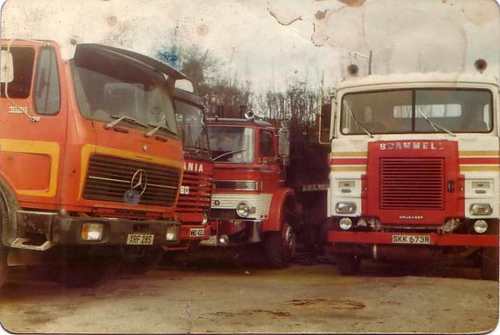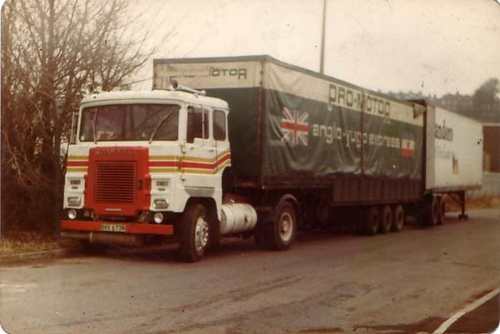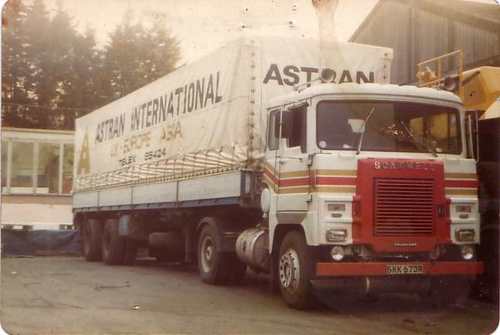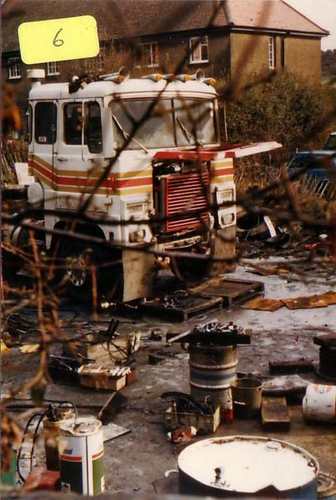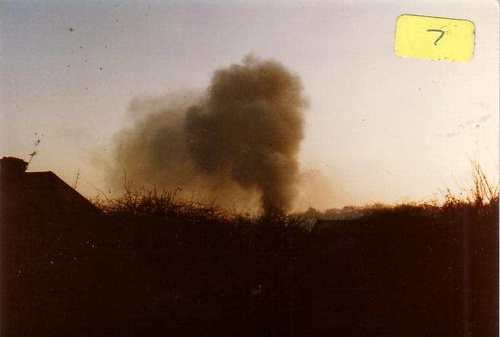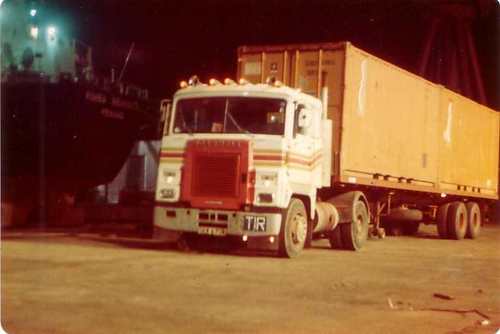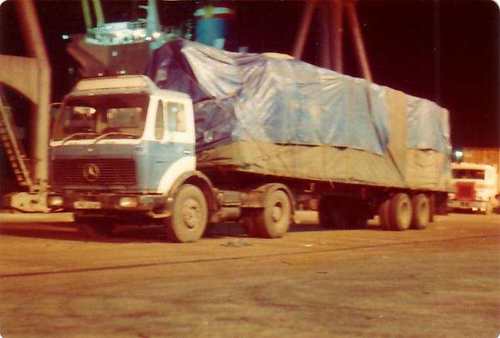CRUSADER
This first picture is my back garden at 99 Station Rd, years before the Council caught up with me. I had just finished the disastrous relationship with J&S Contractors, and the Merc is waiting to go back to the real hire company. My Ford tipper is then being driven by my old Banger Racing Mechanic, Dave Kyle, who we had just rushed through an HGV1 test. I had bought the Crusader from Keith Noakes, and was just starting work with Medway Transport, an agency. This was mainly work off Strood Docks, fruit, timber and paper, but also some container work, and other general haulage.
The Scania 80, just parked behind the Merc, was owned by Steve Lacy, who worked for Promotor, a company that did vehicle repatriation from Europe, and a lot of show and exhibition work. Steve had always wanted to own his own truck. He eventually left Promotor, and became one of the founding partners of Showhaul Trucking. He now lives and works in Germany.
Steve Lacy introduced me to Dave Stagg, the manager of Promotor, and I did quite a bit of work for them at this time.
The Crusader was one of those trucks that just felt perfect from the first moment I sat in it: I had never used a Roadranger box before, but had driven crash boxes. The Roadranger was the sweetest gearbox I had ever used, and coupled with the power of the RR engine, and the sheer size of the beast, gave me a trucking experience I have never equalled. Modern trucks may be more comfortable, more powerful, more reliable, but that truck was the essence of all my boyhood dreams.
Just a shame that the RR engine was unreliable, the truck was a pig to work on, and the suspension eventually killed my back, and it took several years of Scania therapy to cure it. It still brings a tear to the corner of my eye.
Another contact made in those early days was Astran, the pioneers of the overland route to the Middle East. They were looking for a local company that could tip and reload their trailers while their drivers had time off and the tractors were serviced. This relationship blossomed, and when we took on our fiirst warehouse, Astran moved in with us. The adventures of the Astran drivers, and our association with them over the years could provide enough material for another website.
As mentioned, the biggest problem with the Crusader was the unreliability of the Roller engine. It never actually stopped working, ( although it could be a pig to start on a cold morning), but it seemed incapable of keeping oil and water in their seperate areas of the engine. Water in the oil meant oil changing every couple of weeks, including a two day de-sludge with a detergent flushing oil, but oil in the water meant all the tiny pipes in the heating system were permanently blocked with gunge. I had many a trip up the country in my sleeping bag, with Colin McKay in convoy taking the mick in his superbly heated Mack as he sat in a T shirt and his chocolate melted.
Here I have stripped the engine in the yard, but due to my bad luck with water, it then proceeded to rain for about a week, whereupon the yard flooded to a depth of about a foot, the oil drums filled up with water and shot the oil on the floor, which then happily floated off everywhere. It was at this moment an unhappy neighbour took this pic which appeared in a dossier at one of my many planning inquiries. No soul, some people.
The pic above was also taken by my friendly neighbour, and shows the Crusader coughing into life on a crisp autumn morning.
As I mentioned before, the Crusader did not like starting in the morning. This was partly due to the sheer inefficiency of the little glowplug fired diesel pre-heater. I the remembered an old trucker telling me about a trick they used to use on the old recalcitrant TS3 Commer two-strokes: a flaming diesel rag in the air intake.
This worked a treat, until one morning, about 3am, bitter cold with a dusting of icy snow, the battery was flat. I borrowed the trolley mounted battery set from the bus depot down the road, and had another go. Because I needed to hold the battery terminals on, and turn the key, and wave the flaming diesel rag, I came up with a cunning plan.
I removed the air filter, and just laid the flaming rag in the steel filter compartment: brilliant. Engine fired, put battery leads down safely and turned to discover, engine roaring away with the hand throttle, that small warming diesel flame, had now turned into a 4ft flamethrower with a conflagration disappearing into the bowels of the engine. Then the fire caught the plastic turbine blades in the back of the airfilter, and then the fabric and rubber pipe to the turbo.
I am standing watching my beloved Crusader turn into a bonfire, still slightly loath to actually switch off the engine until it had warmed up, without realising in my panic the extreme irony of that thought. I then had the apparent presence of mind to actually turn the engine off. Deprived of the suction of the engine, the by now quite considerable conflagration turned, quite naturally, upwards, and flame began licking the timber base of the fibreglass sleeper pod. Fortunately at this time my original generous helping of diesel had started to run out, and with a final burp of putrid smoke, the fire went out. Believe it or not, after I had stopped shaking, she started again first time, and never missed a beat, Even began starting better in the morning, must have scared her!
This is the Crusader loading at the West Africa Terminal at Tilbury, another job organised by Medway Transport. This container actually made it onto my truck without any damage to me, the box, the ship or the Dock, quite a rare occasion in those halcyon days.
Tilbury, with its strong unions, had this almost modern PC concept that as all men are equal, they are capable of all doing any job. So you would get the ludicrous situation of a man loading a 40ft 20t container with a HUGE forklift, who had only ever driven an electric sweeper until that day. We were loading some empty reefer boxes here one day, and I watched in amazement as the machine driver missed the fork pockets completely, and stabbed through the fibreglass sides. One would think he would then back off and try again, Wrong! you obviously don't understand the docker.
He proceeds to lift the forks until they tear up the side of the box to the top steel rail. He then tries to lift taking the weight on the forks on the inside of the roof. Gravity takes over then, the forks tear through the roof, and the container is then swinging gaily at 45 degrees emitting a hail of fibreglass splinters, assorted rivets and panic stricken rodents.
Completely unfazed by this turn of events, he then tries to load it by swinging it across my skelly to the far twistlocks, in an attempt to scrape it off in the vain hope it will drop neatly into place. Whereupon the poor deflowered box, having had enough of this treatment, slides itself gently off the forks onto the floor on the far side, where with a sigh of relief it expired. The forklift driver was quite miffed that I now refused to accept the container : and the Foreman backed him up.......
This is a picture of the legendary Peter Bunkell's Mercedes, also loaded at the West Africa Terminal with a cargo of broomhandles. Peter was one of transport's great eccentrics. He lived on a small-holding outside Strood, and kept horses, which he loved, and would often turn up at work having been up all night with a sick horse, and would smell like a horse and have bits of straw sticking out of his hair and most other orifices.
He arrived with this same Merc at 43 berth Tilbury to collect a container, and they wouldn't let him in because he wasn't signwritten. There was a man nearby painting lines around parking spaces. Peter walks over, dips a finger in the man's road marking paint, and writes "Medway" on his drivers door, wiping the excess off his fingers on the front of his jacket. They were then forced to load him, and during the next few minutes, the paint dripped on down the door. The remains of that "signwriting" were still on the door when he eventually scrapped the truck many, many years later
